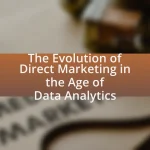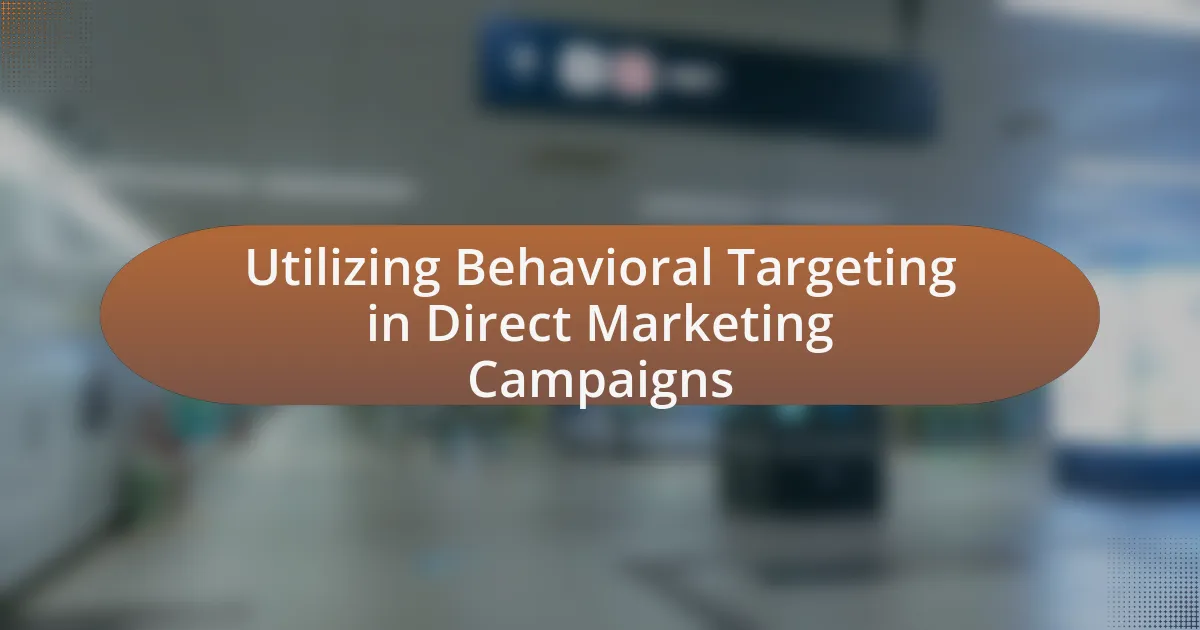The article focuses on best practices for personalizing direct marketing messages, emphasizing the importance of audience segmentation, customer data utilization, and tailored content creation. It highlights how personalization enhances marketing effectiveness by increasing engagement and conversion rates, supported by psychological principles such as reciprocity and social proof. Key elements for successful personalized messaging include recipient data, relevant timing, and the use of technologies like CRM systems and marketing automation tools. The article also addresses challenges marketers face, such as data privacy concerns and the need for effective measurement of personalized marketing success.
What are Best Practices for Personalizing Direct Marketing Messages?
Best practices for personalizing direct marketing messages include segmenting your audience, utilizing customer data, and crafting tailored content. Segmenting your audience allows marketers to group individuals based on shared characteristics, which enhances relevance. Utilizing customer data, such as purchase history and preferences, enables marketers to create messages that resonate with specific needs and interests. Crafting tailored content involves using the recipient’s name and personalizing offers based on their behavior, which can significantly increase engagement rates. According to a study by Epsilon, personalized emails have an average open rate of 29%, compared to 21% for non-personalized emails, demonstrating the effectiveness of these practices.
How does personalization enhance direct marketing effectiveness?
Personalization enhances direct marketing effectiveness by increasing engagement and conversion rates. When marketing messages are tailored to individual preferences and behaviors, recipients are more likely to respond positively. For instance, studies show that personalized emails can lead to a 29% higher open rate and a 41% higher click-through rate compared to non-personalized emails. This effectiveness stems from the ability of personalized content to resonate with the audience, making them feel valued and understood, which ultimately drives sales and customer loyalty.
What psychological principles support personalized marketing?
Personalized marketing is supported by several psychological principles, including the principle of reciprocity, the mere exposure effect, and the concept of social proof. The principle of reciprocity suggests that when consumers receive personalized offers or messages, they feel a sense of obligation to respond positively, as demonstrated in studies showing that personalized communication increases engagement rates. The mere exposure effect indicates that individuals tend to develop a preference for things merely because they are familiar with them; personalized marketing leverages this by repeatedly exposing consumers to tailored content, enhancing brand affinity. Lastly, social proof, which refers to the tendency of individuals to look to others for guidance on how to behave, is utilized in personalized marketing through testimonials and user-generated content that resonate with specific consumer segments, thereby increasing trust and conversion rates.
How does personalization impact customer engagement and loyalty?
Personalization significantly enhances customer engagement and loyalty by creating tailored experiences that resonate with individual preferences. When brands utilize data to customize interactions, customers feel valued and understood, leading to increased satisfaction and repeat purchases. Research indicates that 80% of consumers are more likely to make a purchase when brands offer personalized experiences. Furthermore, personalized marketing can boost customer retention rates by up to 27%, as customers are more inclined to remain loyal to brands that recognize their unique needs and preferences.
What are the key elements of personalized direct marketing messages?
The key elements of personalized direct marketing messages include recipient data, tailored content, and relevant timing. Recipient data involves collecting and analyzing information such as demographics, purchase history, and preferences to create targeted messages. Tailored content ensures that the message resonates with the individual by addressing their specific needs or interests, which can increase engagement and conversion rates. Relevant timing refers to sending messages at optimal moments, such as during special occasions or when a customer is likely to make a purchase, enhancing the likelihood of a positive response. These elements collectively enhance the effectiveness of personalized direct marketing efforts.
What data is essential for effective personalization?
Essential data for effective personalization includes customer demographics, behavioral data, and purchase history. Customer demographics, such as age, gender, and location, help marketers understand their audience segments. Behavioral data, including website interactions and engagement metrics, provides insights into customer preferences and interests. Purchase history reveals past buying patterns, enabling tailored recommendations. Research indicates that 80% of consumers are more likely to make a purchase when brands offer personalized experiences, highlighting the importance of utilizing this data effectively.
How can segmentation improve message relevance?
Segmentation improves message relevance by allowing marketers to tailor their communications to specific groups based on shared characteristics. This targeted approach increases the likelihood that recipients will find the messages meaningful and engaging, as they address the unique needs and preferences of each segment. For example, a study by the Direct Marketing Association found that segmented campaigns can lead to a 760% increase in revenue compared to non-segmented campaigns. By focusing on distinct audience segments, marketers can enhance the effectiveness of their messaging, ultimately driving better engagement and conversion rates.
What technologies facilitate personalized direct marketing?
Technologies that facilitate personalized direct marketing include customer relationship management (CRM) systems, data analytics tools, artificial intelligence (AI), and marketing automation platforms. CRM systems enable businesses to collect and manage customer data, allowing for targeted marketing efforts based on individual preferences and behaviors. Data analytics tools analyze consumer data to identify trends and insights, which can inform personalized marketing strategies. AI enhances personalization by predicting customer behavior and preferences through machine learning algorithms. Marketing automation platforms streamline the execution of personalized campaigns, enabling businesses to deliver tailored messages at scale. These technologies collectively enhance the effectiveness of direct marketing by ensuring that communications are relevant and timely, ultimately improving customer engagement and conversion rates.
How do CRM systems contribute to personalization?
CRM systems contribute to personalization by collecting and analyzing customer data to tailor marketing messages and interactions. These systems aggregate information such as purchase history, preferences, and behavior patterns, enabling businesses to create targeted campaigns that resonate with individual customers. For instance, a study by Salesforce found that 70% of consumers expect personalized experiences from brands, highlighting the importance of data-driven insights in enhancing customer engagement. By leveraging this data, CRM systems facilitate the delivery of relevant content, improving customer satisfaction and loyalty.
What role do automation tools play in personalized messaging?
Automation tools are essential for delivering personalized messaging by enabling marketers to segment audiences, tailor content, and automate communication processes. These tools analyze customer data, such as behavior and preferences, allowing for the creation of targeted messages that resonate with individual recipients. For instance, according to a study by Epsilon, 80% of consumers are more likely to make a purchase when brands offer personalized experiences. This demonstrates that automation tools not only enhance the relevance of messaging but also significantly improve engagement and conversion rates.
How can businesses measure the success of personalized marketing efforts?
Businesses can measure the success of personalized marketing efforts through key performance indicators (KPIs) such as conversion rates, customer engagement metrics, and return on investment (ROI). For instance, tracking conversion rates allows businesses to assess how many personalized messages lead to actual sales, providing a direct measure of effectiveness. Additionally, analyzing customer engagement metrics, such as open rates and click-through rates for personalized emails, offers insights into how well the audience responds to tailored content. A study by McKinsey & Company found that personalized marketing can deliver five to eight times the ROI on marketing spend, highlighting the financial impact of effective personalization strategies.
What metrics should be tracked for personalized campaigns?
The metrics that should be tracked for personalized campaigns include customer engagement rates, conversion rates, click-through rates, and customer lifetime value. Customer engagement rates measure how effectively the campaign resonates with the audience, while conversion rates indicate the percentage of users who take a desired action, such as making a purchase. Click-through rates reflect the effectiveness of the campaign in prompting users to engage with the content, and customer lifetime value assesses the total revenue a business can expect from a customer throughout their relationship. Tracking these metrics allows marketers to evaluate the success of their personalized campaigns and make data-driven adjustments for improved performance.
How can A/B testing improve personalization strategies?
A/B testing can significantly enhance personalization strategies by allowing marketers to compare different versions of content to determine which resonates more with specific audience segments. This method provides data-driven insights into consumer preferences, enabling the optimization of marketing messages based on actual user behavior rather than assumptions. For instance, a study by the Nielsen Norman Group found that A/B testing can lead to conversion rate improvements of up to 300% when tailored to user preferences. By systematically testing variations in messaging, visuals, and offers, marketers can refine their personalization efforts, ensuring that communications are more relevant and effective for each target group.
What challenges do marketers face in personalizing direct marketing messages?
Marketers face several challenges in personalizing direct marketing messages, primarily due to data privacy concerns, technological limitations, and the complexity of consumer behavior. Data privacy regulations, such as GDPR and CCPA, restrict how marketers can collect and use consumer data, making it difficult to create tailored messages. Additionally, many marketers struggle with integrating various data sources and utilizing advanced analytics tools, which are essential for effective personalization. Furthermore, understanding the diverse preferences and behaviors of consumers adds another layer of complexity, as marketers must continuously adapt their strategies to meet evolving expectations.
How can data privacy concerns affect personalization efforts?
Data privacy concerns can significantly hinder personalization efforts by limiting the data available for analysis and targeting. When consumers are apprehensive about how their personal information is collected and used, they may opt out of data-sharing practices or provide inaccurate information, which directly impacts the effectiveness of personalized marketing strategies. For instance, a survey by Pew Research Center found that 79% of Americans are concerned about how their data is being used by companies, leading to increased regulatory scrutiny and consumer demand for transparency. This environment can result in businesses facing challenges in gathering sufficient data to create tailored marketing messages, ultimately reducing engagement and conversion rates.
What are common pitfalls in implementing personalized marketing?
Common pitfalls in implementing personalized marketing include inadequate data collection, over-segmentation, and neglecting customer privacy. Inadequate data collection leads to incomplete customer profiles, which hampers the effectiveness of personalized campaigns. Over-segmentation can result in overly narrow targeting, alienating potential customers who do not fit into specific categories. Neglecting customer privacy can damage trust and lead to regulatory issues, as consumers increasingly demand transparency regarding how their data is used. According to a 2021 survey by McKinsey, 71% of consumers feel frustrated when their experience is impersonal, highlighting the importance of balancing personalization with privacy and data integrity.
What are the future trends in personalized direct marketing?
Future trends in personalized direct marketing include the increased use of artificial intelligence and machine learning to analyze consumer data for more tailored messaging. These technologies enable marketers to predict customer behavior and preferences, allowing for hyper-personalized campaigns that resonate more effectively with individual consumers. According to a report by McKinsey, companies that excel in personalization can achieve a 10-30% increase in revenue, highlighting the financial benefits of adopting these advanced techniques. Additionally, the integration of omnichannel marketing strategies will become more prevalent, ensuring a seamless customer experience across various platforms, further enhancing the effectiveness of personalized marketing efforts.
How is artificial intelligence shaping personalized marketing strategies?
Artificial intelligence is transforming personalized marketing strategies by enabling businesses to analyze vast amounts of consumer data to tailor marketing messages effectively. AI algorithms process data from various sources, such as browsing history, purchase behavior, and social media interactions, allowing marketers to create highly targeted campaigns. For instance, a study by McKinsey & Company found that companies using AI for personalization can increase their marketing ROI by 10 to 30 percent. This data-driven approach not only enhances customer engagement but also improves conversion rates, as personalized content resonates more with individual preferences and needs.
What emerging technologies should marketers watch for personalization?
Marketers should watch for artificial intelligence (AI), machine learning, and augmented reality (AR) as emerging technologies for personalization. AI and machine learning enable marketers to analyze vast amounts of consumer data to create tailored experiences, improving engagement and conversion rates. For instance, a study by McKinsey found that companies using AI for personalization can increase their marketing ROI by 20% or more. Additionally, AR allows consumers to visualize products in their own environment, enhancing the shopping experience and driving sales. According to a report by Deloitte, 88% of consumers surveyed expressed interest in using AR for shopping, indicating its potential impact on personalized marketing strategies.
What practical tips can enhance personalized direct marketing messages?
To enhance personalized direct marketing messages, utilize customer data effectively to tailor content. Segment your audience based on demographics, purchase history, and behavior to create targeted messages that resonate with specific groups. Incorporate dynamic content that changes based on the recipient’s preferences or past interactions, ensuring relevance. Use personalized subject lines and greetings to increase open rates; studies show that emails with personalized subject lines have a 26% higher open rate. Additionally, implement A/B testing to refine messaging strategies based on real-time feedback and engagement metrics.

















